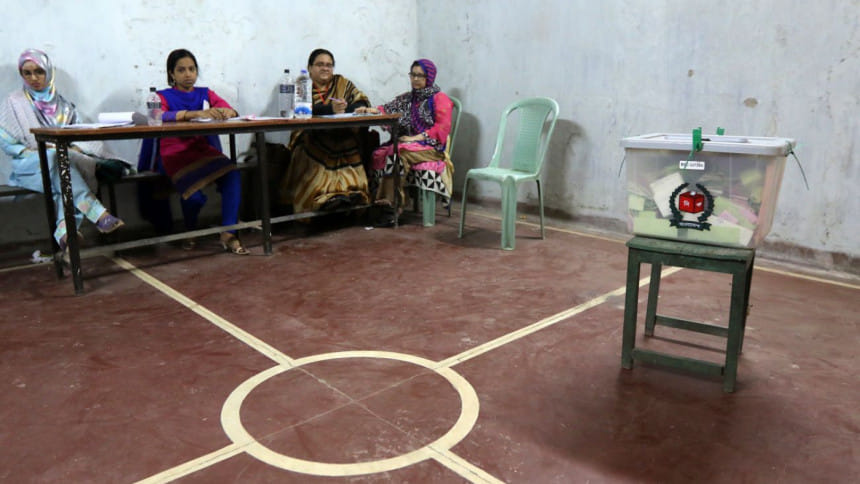Winning and losing in city corporation elections

TIME and tide wait for none, and neither did the elections on April 28. There were reportedly rampant rigging and random violence, which led to the rude boycott by most of the opposition candidates. None of these, however, stopped the show. Polling centres stayed open, ballot stuffing continued unabated, and votes were counted before winners won by a landslide. Last time we heard of such a vacuous victory was when Caligula Caesar had led his army to the sea and told the Roman senate he had conquered England.
There was a near similar victory further back in time. King Pyrrhus of Epirus had suffered irreplaceable casualties in defeating the Romans. Hence, the phrase "Pyrrhic victory" was coined. It describes a victory which inflicts such a devastating toll on the victor that it's tantamount to defeat. Anybody who wins such a victory is pitied as a loser. One can call it hollow victory as well.
So, who won the three city corporation elections? If we go by vote counts, smiling faces, and V signs flashed at photo opportunities, the winners were already obvious. Since they took oath of office last Wednesday, there's no doubt who are the mayors and councillors for the next five years. But these esoterically elected people are a ringing contradiction. They have assumed public office when people aren't sure they wished to elect the same individuals.
This is why these elections can be compared to those of 2014, except for a slight difference. This time BNP and a few other political parties fielded
candidates, who participated in
campaigns but not in the elections. That's because most of the candidates withdrew from the race on the Election Day before the sun dipped in the western sky. No matter how one looks at it, those elections weren't elections for the same reason a show isn't finished until the curtain call.
When victory is hollow, it doesn't matter who wins or loses. The so-called winners of the City Corporation elections will be mayors and councillors in the manner the winners of last year's parliamentary elections have been parliament members. Thus yet another layer of political office has been subjected to the subjunctive, while, in-between, the staggered upazila elections, in phases, were also allegedly vitiated by manipulations.
Now that all three layers have been stacked with managed victories, elections have been turned into a practical joke. This is not to say that the winners of all these elections couldn't have won, but their winning has been devoid of that magic, which makes victory victorious in the true sense of the word. The winners have forcibly taken victory instead of earning it in their own right.
An erudite guest recently waxed eloquent on a television talk show. He said that bad elections were better than no elections. It was as if he meant to say that eating poisonous food was better than hopeless starvation. One wonders what wisdom must have prompted him to arrive at that silly conclusion. He effectively gave indulgence to one wrong against another without realising that two wrongs don't make a right.
But he surely deserves credit for highlighting the horrible fact: the city corporation elections were very bad. Those elections could have been a potential game changer and given our nasty politics a new direction. This nation missed yet another opportunity to turn a new page.
It's unfortunate that the people of three city corporations will have to live with the virtual victors. One of them has primarily vowed to eradicate mosquitoes, another to solve traffic congestion and the third one to save his city from flooding during the rainy season. Those who have voted for them will have reasons to believe in them. Those who haven't will always doubt their intentions.
Meanwhile, something very crucial is slipping through the crack. Our struggle for independence was rooted in our struggle for democracy as people rose in their determination to shake off foreign subjugation. Now that people are increasingly becoming disillusioned with politics and losing faith in politicians, they are also showing the symptoms of children from broken homes.
The ultimate tragedy will strike if people become withdrawn. It will no longer matter who wins or loses any of the many elections. It will not even matter who rules this country and whether the rulers are native or foreign, since the gap between them has been narrowing with every election.
It's relevant to ask who lost those elections. The reply comes back full circle to the vicarious victors. BNP bankrupted itself in the past, and it has been paying the price. Jatiya Party has never been anything but bankrupt from the start. Jamaat-e-Islam is crumbling and the left parties are stagnant. All in all, the elections proved this country is undone because the ruling party also is no exception.
The writer is the Editor of the weekly First News and an opinion writer for The Daily Star.
Email: [email protected]

 For all latest news, follow The Daily Star's Google News channel.
For all latest news, follow The Daily Star's Google News channel. 



Comments